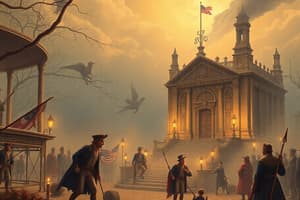Podcast
Questions and Answers
What primarily caused friction between the British government and its North American colonies?
What primarily caused friction between the British government and its North American colonies?
- Cultural differences
- Taxation without representation (correct)
- Religious conflicts
- Territorial disputes
What development prompted the delegates to the First Continental Congress to believe reconciliation with Great Britain was impossible?
What development prompted the delegates to the First Continental Congress to believe reconciliation with Great Britain was impossible?
- The signing of the Treaty of Paris
- The Stamp Act
- The Boston Tea Party
- The Intolerable Acts (correct)
How did the French and Indian War financial situation affect the colonies?
How did the French and Indian War financial situation affect the colonies?
- It resulted in Britain expecting the colonies to help pay the war debt. (correct)
- It caused a decrease in British military presence.
- It led to independence movements in Canada.
- It diminished British interest in American territories.
Which event directly followed the Boston Massacre in 1770?
Which event directly followed the Boston Massacre in 1770?
What was a major consequence of the Stamp Act introduced in 1765?
What was a major consequence of the Stamp Act introduced in 1765?
What significant action did the Second Continental Congress take on July 4, 1776?
What significant action did the Second Continental Congress take on July 4, 1776?
What legislative body held its first meeting in September 1774?
What legislative body held its first meeting in September 1774?
Which conflict is often considered the start of the Revolutionary War?
Which conflict is often considered the start of the Revolutionary War?
What philosophical justification does Jefferson offer for declaring independence?
What philosophical justification does Jefferson offer for declaring independence?
What rights does Jefferson specifically mention in the Declaration?
What rights does Jefferson specifically mention in the Declaration?
What was the main purpose of the Declaration of Independence regarding King George?
What was the main purpose of the Declaration of Independence regarding King George?
What principle does Jefferson associate with the idea of citizens overthrowing their government?
What principle does Jefferson associate with the idea of citizens overthrowing their government?
Which Enlightenment philosopher significantly influenced Jefferson?
Which Enlightenment philosopher significantly influenced Jefferson?
What does popular sovereignty refer to in the Declaration?
What does popular sovereignty refer to in the Declaration?
What document was adopted by the Second Continental Congress in November 1777?
What document was adopted by the Second Continental Congress in November 1777?
What concept does the Declaration emphasize regarding government and citizens' rights?
What concept does the Declaration emphasize regarding government and citizens' rights?
What was a primary fear of the document's authors regarding government structure?
What was a primary fear of the document's authors regarding government structure?
Why did the authors believe democracy would function better at a certain level?
Why did the authors believe democracy would function better at a certain level?
Which structure did the Articles of Confederation establish for the legislature?
Which structure did the Articles of Confederation establish for the legislature?
What requirement did the Articles of Confederation mandate for amending the Articles?
What requirement did the Articles of Confederation mandate for amending the Articles?
What major weakness did the government under the Articles of Confederation endure?
What major weakness did the government under the Articles of Confederation endure?
What was one function that the national government could perform under the Articles of Confederation?
What was one function that the national government could perform under the Articles of Confederation?
Which description best summarizes the Articles of Confederation’s government structure?
Which description best summarizes the Articles of Confederation’s government structure?
Which essential department was missing in the government under the Articles of Confederation?
Which essential department was missing in the government under the Articles of Confederation?
What was a significant issue arising from the inability of the national government to regulate tariffs?
What was a significant issue arising from the inability of the national government to regulate tariffs?
What problem arose from each state printing its own currency?
What problem arose from each state printing its own currency?
What event highlighted the weaknesses of the national government under the Articles of Confederation?
What event highlighted the weaknesses of the national government under the Articles of Confederation?
What was the primary goal of the delegates at the Constitutional Convention?
What was the primary goal of the delegates at the Constitutional Convention?
What was one major consequence of lacking an executive branch under the Articles of Confederation?
What was one major consequence of lacking an executive branch under the Articles of Confederation?
What did the ratification of the Constitution signify in 1788?
What did the ratification of the Constitution signify in 1788?
How did high unemployment influence Shays's Rebellion?
How did high unemployment influence Shays's Rebellion?
What was a crucial factor in the chaotic situation under the Articles of Confederation?
What was a crucial factor in the chaotic situation under the Articles of Confederation?
Flashcards
Declaration of Independence
Declaration of Independence
A document declaring the American colonies' separation from Great Britain.
Articles of Confederation
Articles of Confederation
The first attempt at a unified government in the newly independent United States.
French and Indian War
French and Indian War
A war between Great Britain and France in North America.
Stamp Act
Stamp Act
Signup and view all the flashcards
Boston Tea Party
Boston Tea Party
Signup and view all the flashcards
Intolerable Acts
Intolerable Acts
Signup and view all the flashcards
First Continental Congress
First Continental Congress
Signup and view all the flashcards
American Revolution
American Revolution
Signup and view all the flashcards
Articles of Confederation Weakness
Articles of Confederation Weakness
Signup and view all the flashcards
Fear of Tyranny
Fear of Tyranny
Signup and view all the flashcards
Confederation Structure
Confederation Structure
Signup and view all the flashcards
Unicameral legislature
Unicameral legislature
Signup and view all the flashcards
National government Powers
National government Powers
Signup and view all the flashcards
Absence of Executive Branch
Absence of Executive Branch
Signup and view all the flashcards
Lack of Tax Power
Lack of Tax Power
Signup and view all the flashcards
Limited Judicial Power
Limited Judicial Power
Signup and view all the flashcards
Natural Rights
Natural Rights
Signup and view all the flashcards
Popular Sovereignty
Popular Sovereignty
Signup and view all the flashcards
Declaration of Independence - Justification
Declaration of Independence - Justification
Signup and view all the flashcards
John Locke
John Locke
Signup and view all the flashcards
Second Continental Congress
Second Continental Congress
Signup and view all the flashcards
1777
1777
Signup and view all the flashcards
Violation of Rights
Violation of Rights
Signup and view all the flashcards
Trade Disputes under Articles
Trade Disputes under Articles
Signup and view all the flashcards
National Currency Issue
National Currency Issue
Signup and view all the flashcards
Shays's Rebellion Cause
Shays's Rebellion Cause
Signup and view all the flashcards
Need for a Central Government
Need for a Central Government
Signup and view all the flashcards
Replacing the Articles
Replacing the Articles
Signup and view all the flashcards
US Constitution Ratification
US Constitution Ratification
Signup and view all the flashcards
Weakened National Government under Articles
Weakened National Government under Articles
Signup and view all the flashcards
Economic Struggles
Economic Struggles
Signup and view all the flashcards
Study Notes
The Declaration of Independence and the Articles of Confederation
- Great Britain accumulated resources from the New World between 1500 and 1775.
- Conflicts arose between the British government and its North American colonies regarding the level of British control and taxation.
- Colonists believed they should not be taxed without representation in the British government.
- The Second Continental Congress, convinced reconciliation was impossible, gradually shifted towards independence.
The Events Leading to Independence
- February 10, 1763: French and Indian War concluded, leaving Britain with significant debt.
- March 1765: The Stamp Act imposed taxes on colonies.
- 1767-1770: The Townshend Acts imposed further taxes.
- March 5, 1770: The Boston Massacre heightened tensions.
- May 1773: The Tea Act led to the Boston Tea Party.
- 1774: The Intolerable Acts (punitive measures) were enacted.
- September 5, 1774 – October 26, 1774: The First Continental Congress met.
- April 18, 1775 – April 19, 1775: Battles of Lexington and Concord marked the start of the American Revolutionary War.
- May 10, 1775 – July 4, 1776: The Second Continental Congress declared independence with the Declaration of Independence.
Principles of the Declaration
- Thomas Jefferson's declaration reflected Locke's philosophy of natural rights: life, liberty, and the pursuit of happiness as inherent rights.
- Government exists to safeguard those rights.
- The Declaration outlined the king's abuses of these rights.
- Delegates sought political representation, consent to taxation, and a fair trial.
- They believed in the principles of natural rights, popular sovereignty, and order/stability.
- Citizens should only overthrow government in dire circumstances when fundamental rights are violated.
Articles of Confederation
- November 1777: The Second Continental Congress adopted the Articles of Confederation.
- This document aimed to prevent a strong central government and monarchy.
- The Articles had a weak central government with no executive or judicial branch, relying on the states for enforcement of national laws.
- There was no national currency and different states had varying tariffs and trade regulations.
- This created significant disputes between states.
Weaknesses of the Articles and Shays's Rebellion
- The national government had limited powers and couldn't collect taxes effectively.
- The absence of a strong central government led to economic problems like high inflation and unemployment in the US.
- This instability was highlighted by Shays's Rebellion.
- The rebellion underscored the weaknesses of the Articles and the urgent need for a stronger central government.
- The delegates realized the Articles needed to be replaced with a new constitution.
- 1788: The Constitution replaced the Articles of Confederation.
Studying That Suits You
Use AI to generate personalized quizzes and flashcards to suit your learning preferences.




